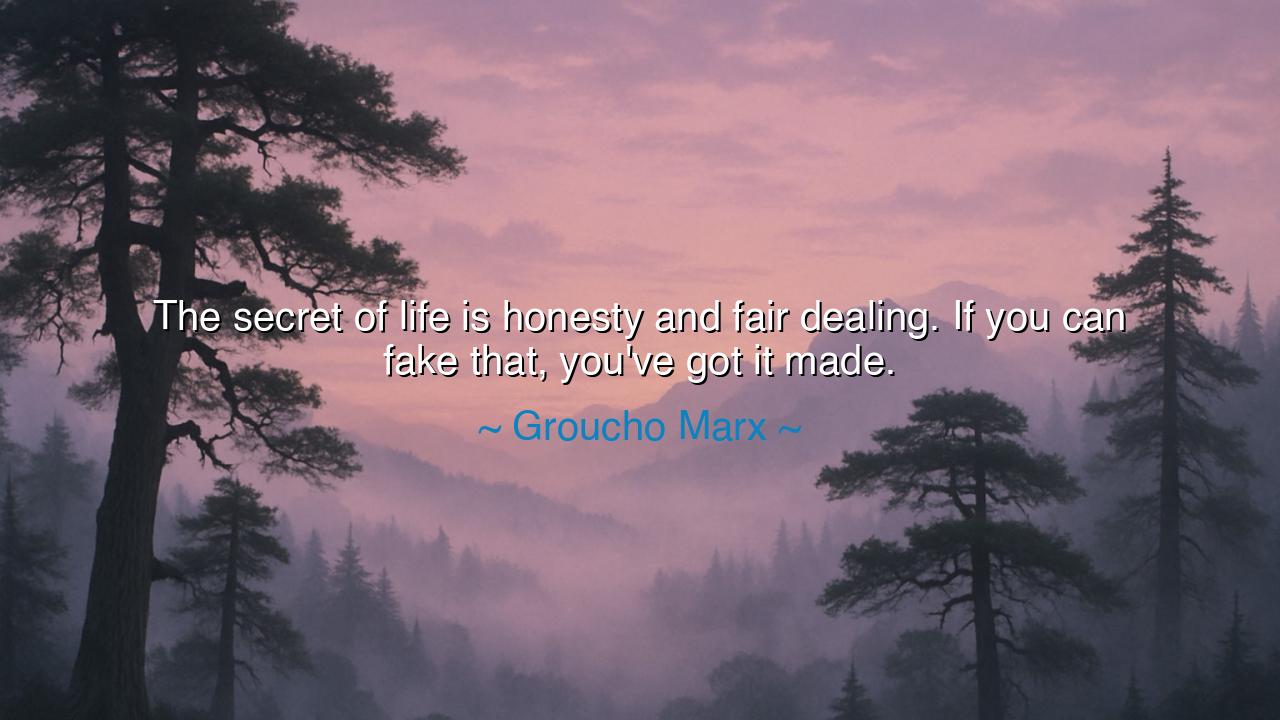
The secret of life is honesty and fair dealing. If you can fake
The secret of life is honesty and fair dealing. If you can fake that, you've got it made.






Hear the mischievous but piercing words of Groucho Marx, master of wit and satire: “The secret of life is honesty and fair dealing. If you can fake that, you’ve got it made.” At first, these words ring as a jest, a playful inversion of morality. Yet beneath the cloak of humor lies a blade of truth, sharp and unsettling. Groucho, with laughter as his weapon, exposes the hypocrisy of a world where appearances often matter more than substance, and where men are too easily deceived by the image of virtue rather than its reality.
The origin of this saying is the vaudeville and stage world of the early twentieth century, an age when humor was not merely entertainment but commentary. Marx, like the jester of old courts, spoke truths that kings and commoners alike preferred to ignore. His comedy was a mirror in which society saw its own absurdities. By declaring that the secret of life is honesty—and then mocking it by suggesting it could be “faked”—he revealed the uneasy reality that success often comes not to the virtuous, but to those skilled in the art of pretending to be virtuous.
History itself bears witness to this paradox. Recall the tale of Alcibiades, the brilliant but untrustworthy Athenian general. He spoke with charm, persuaded with eloquence, and cloaked himself in the appearance of devotion to Athens. Yet behind his mask lay selfish ambition. For a time, he rose to greatness, beloved and followed, precisely because he “faked” the virtues of loyalty and honesty. His downfall came only when his deceptions were unmasked, proving that while pretense may bring temporary success, it cannot secure eternal honor. Thus Groucho’s jest carries both humor and warning.
Consider also the politicians of every age, who rise to power not always by truth, but by the appearance of fair dealing. They smile, they promise, they shake hands, presenting themselves as champions of honesty. Some indeed embody these virtues, but many simply play the role long enough to gain wealth or power. The masses, longing to believe in goodness, are often quick to accept the mask. Here we see why Marx’s satire bites so deeply: society often rewards the illusion of honesty more than honesty itself.
Yet Groucho, in his jest, also reminds us of the power of authenticity. For though deception may win quick gains, the soul knows the truth of itself. To live always in disguise is to carry a heavy burden, for the mask grows heavier with time. True honesty and fair dealing may not always bring swift reward, but they build trust, legacy, and peace of spirit. Even the trickster’s joke cannot erase this deeper truth: life without integrity is but a hollow comedy, laughter without joy.
The lesson, O listener of tomorrow, is this: be wary of those who only wear the garments of virtue, and do not be tempted to wear them falsely yourself. Know that appearances can deceive, but time unmasks all men. The world may reward the illusion for a season, but only character endures beyond the moment. Take the humor of Marx as both jest and admonition—laughter that reveals the dangers of a life built on pretense.
Therefore, take action. Cultivate honesty not as a costume, but as the marrow of your being. Deal fairly not for appearances, but because justice strengthens the soul. Yet also keep your eyes open, for not all who smile are true. Discern the mask from the face, the illusion from the reality. And if you would laugh, let it be the laughter of one who sees the folly of falsehood and chooses the nobler path. In this way, you will not merely “have it made” in the eyes of the world—you will have it made in the eternal sense, living with a heart unmasked.






AAdministratorAdministrator
Welcome, honored guests. Please leave a comment, we will respond soon